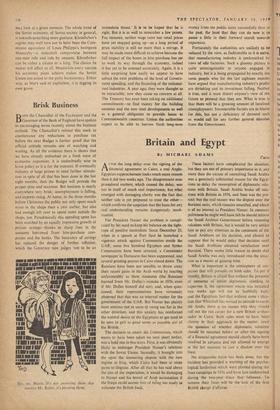Britain and Egypt
By MICHAEL ADAMS
Cairo
AI I ER the long delay over the signing of the financial agreement in Cairo, a real Anglo- Egyptian rapprochement looks much more remote than it did two weeks ago. The disagreement over procedural matters, which caused the delay, was not in itself of much real importance; but what emerged with damaging clarity was the fact that neither side is yet prepared to trust the other— which confirms the suspicion that the basis for any real understanding remains dangerously insub- stantial.
For President Nasser the problem is compli- cated by his need to keep his balance on the tight- rope of positive neutralism. Since December 23, when in a speech at Port Said he launched a vigorous attack against Communism inside the UAR, some five hundred Egyptian and Syrian Communists have been arrested, a Communist newspaper in Damascus has been suppressed, and several printing presses in Cairo closed doWn. The Russians have been too sensible to throw away their recent gains in the Arab world by reacting unfavourably to these measures (the Russians learned from Mr. Dulles's mistake in 1956, even if Mr. Dulles himself did not), and, when ques- tioned, their representatives have virtuously observed that this was an internal matter for the government of the UAR. But Nasser has plainly been anxious not to seem to swing too far in the other direction, and this anxiety has reinforced the natural desire of the Egyptians to get (and to be seen to get) as good terms as possible out of the British.
The decision to attack the Communists, which seems to have been taken on very short notice, was a bold one in two ways. First, it was obviouily likely to endanger President Nasser's relations with the Soviet Union. Secondly, it brought into the open the simmering dispute with the new regime in Iraq, which Cairo had been at some pains to disguise. After all that he has said about the sins of the imperialists, it would be damaging to Nasser and his brand of Arab nationalism if the Iraqis could accuse him of being too ready to welcome the British back. These factors have complicated the situation, but they are not of primary importance in it,'any more than the excuse of consulting Saudi Arabia was a genuinely substantial reason for the Egyp- tians to delay the resumption of diplomatic rela- tions with Britain. Saudi Arabia broke off rela- tions with Britain in 1956, and Suez was the pre- text; but the real reason was the dispute over the Buraimi oasis, which remains unsettled, and which is of no interest to President Nasser. In common politeness he might well have felt he should inform the Saudi Arabian Government before resuming relations with Britain, but it would be very unlike him to pay any attention to the comments of the Saudi Arabians on his decision, and absurd to suppose that he would delay that decision until the Saudi Arabians obtained satisfaction over Buraimi. There seems little reason to doubt that Saudi Arabia was only introduced into the situa- tion as a means of gaining time.
What is important is the atmosphere of sus- picion that still prevails on both sides. To put it bluntly, Britain is afraid that without the presence of someone of senior diplomatic standing to supervise it, the agreement' which was initialled two weeks ago will not be faithfully kept: and the Egyptians feel that without some i-dica- tion that Whitehall has revised its attitude towards th'e Arabs, there is no reason why they should roll out the red carpet for a new British ambas- sador in Cairo. Both sides seem to have been clumsy in their approach to the matter, since the question of whether diplomatic relations should be resumed before or after the signing of a financial agreement should clearly have been resolved in advance and not allowed to emerge at the last moment to cast a shadow over the feast.
No irreparable harm has been done; but the incident has provided 'a warning of the psycho- logical Iandmines which Were planted during the Suez campaign in ly56 and have lain undisturbed during the two-year .truce that followed. To remove their fuses will be the task of the first British charge d'affaires.










































 Previous page
Previous page